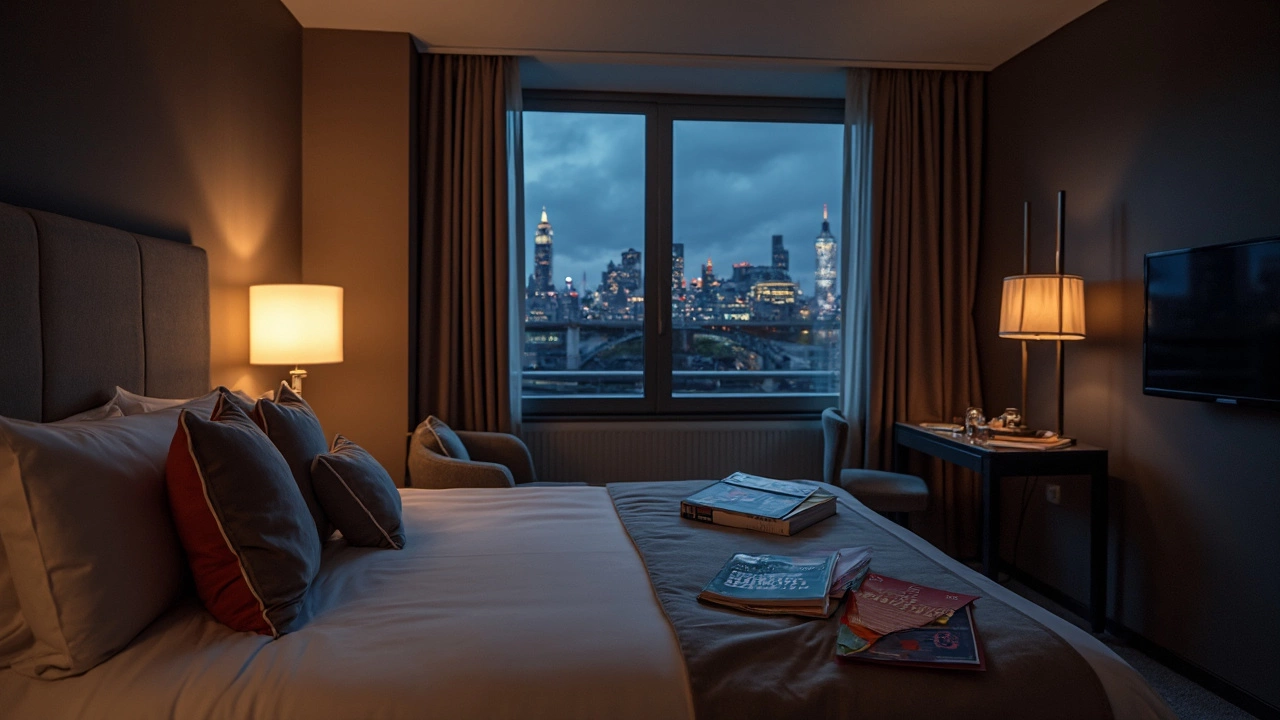You know those hotels you hear about where couples sneak away for a few hours or a night just to be alone? They're called love hotels, and, honestly, they're not as scandalous as TV makes them sound. In fact, they’re everywhere, especially in places like Japan and South Korea. The cool thing is, every country has its own nickname for these spots, and the experience can be totally different depending on where you go.
If you're traveling and wondering what to search for, it actually matters what you call them. For example, in Japan, they’re pretty much always called “love hotels” or just “rabuho.” In South Korea, look for “motels” or sometimes “yeogwan.” Latin America? They’re often known as “hoteles de paso” or “auto-hotels.” The names can be low-key on purpose to keep things discreet. So, no, you probably won’t see a neon sign screaming “LOVE HOTEL” in the middle of Paris or Mexico City.
- The Origins of Love Hotels
- What Are Love Hotels Called in Different Countries?
- How Love Hotels Work
- Surprising Features and Tips
- When and Why Couples Choose Love Hotels
The Origins of Love Hotels
Love hotels actually have a pretty straightforward history. The whole idea started in Japan after World War II. Back then, crowded homes meant young couples and married folks didn't have anywhere super private to spend time together. So, these new places popped up that offered a room for a quick stay—no questions asked. The first official spot that used the term “love hotel” was Hotel Love in Osaka, which opened in 1968. That’s where the name stuck, and it’s why people still call them that in Japan today.
It didn’t take long for the concept to spread. The privacy and convenience made them a hit, not just for secret dates but also for travelers needing a short rest. Pretty soon, other countries in Asia, like South Korea and Taiwan, picked up the trend with their own twists. Latin America was next, especially places like Brazil and Mexico, where the design and services got even more creative—think drive-in garages and themed rooms.
The main thing that set love hotels apart from normal hotels was the focus on privacy. Most of these hotels had separate entrances, automatic check-ins, and even rooms you could book by the hour instead of a whole night. You didn't have to deal with nosey front desk workers or awkward small talk—just straight to business. That privacy-first mindset is still what makes these hotels stand out around the world.
What Are Love Hotels Called in Different Countries?
It seems pretty simple—just look up "love hotel" wherever you are, right? Not exactly. The names for these hotels change depending on the country, and sometimes even city to city. You'll totally miss them unless you know what to look for. Here’s where it gets interesting (and honestly, kind of fun).
In Japan, the term is straight-up: “love hotel,” or rabuho (ラブホテル). That's where the love hotels trend really took off. These hotels are usually covered in flashy lights and sometimes have wild themes. You can book them by the hour or for the night—no awkward check-in needed. In fact, the industry hit a peak in the late 2000s with over 30,000 of these hotels across Japan, according to the Japan National Tourism Organization.
South Korea calls them “motels.” But don’t expect something like a highway roadside motel in the States. Korean motels are often stacked next to each other in districts known as “Hotel Streets,” with neon signs and, yes, the classic curtained parking lots. Teens and couples go for privacy, and you’ll see a big mix from the simple to the mega-fancy. You might hear “yeogwan” (여관), for budget stays or even "bijou hotel" for a splashier option.
In Brazil and much of Latin America, search for “motel” (not to be confused with U.S. motels) or “hotel de paso.” These places are normal for couples, especially in big cities. Pull-under parking means you’ll rarely bump into anyone else. Mexican love hotels, or “auto-hoteles,” make up an entire industry, with an estimated 5,000 around the country.
Europe has its own twist. In France and Italy, look for “chambre d’amour” or “hotel discret,” usually booked by couples needing some privacy. In Spain and Portugal, “hostal” or “hotel para adultos” might fit the bill. They fly under the radar, blending right in with other small hotels, but if the booking rules are by the hour, you’re in the right spot.
Check out this quick table if you’re traveling and need to know what to search for:
| Country | Common Name(s) | What to Expect |
|---|---|---|
| Japan | Love Hotel, Rabuho (ラブホテル) | Themed rooms, hourly/nightly rates, vending machines, touch screen walls |
| South Korea | Motel, Yeogwan (여관) | Discreet check-in, themed rooms, private parking |
| Mexico/Brazil | Motel, Auto-hotel, Hotel de Paso | Individual garages, hourly stays, snacks to room |
| Spain/Portugal | Hostal, Hotel para Adultos | Discreet service, hourly rates |
| France/Italy | Chambre d’amour, Hotel discret | Understated signage, adult-only floors, hourly or nightly |
If you’re curious about the vibe, travel writer Ashley Rawlins says,
“Japan’s love hotels are way more than just a bed—they’re an experience, with everything from disco ball lighting to karaoke rooms, and you don’t need to feel embarrassed. Locals know it’s normal.”
So if you ever need a romantic escape on your travels, just remember the local code word. You’ll find a whole new side of the city you’d never see otherwise.

How Love Hotels Work
Walking into a love hotel is way different from a regular hotel check-in. Privacy comes first, so you’ll rarely need to talk to anyone at the front desk. In countries like Japan, there’s often a panel or touchscreen with room photos and prices. You just pick a room, press the button, and you’re good to go. Sometimes you even check in and pay through a machine—even change for big bills gets dispensed right there, so there are no awkward hang-ups.
Rates are usually divided into two options: a short "rest" (which can be anywhere from one to three hours) or an overnight stay. If you’re in a hurry, picking a short stay saves money. If you want to chill, overnight gives you more time. South Korea’s hotels follow a similar system—pay up front, minimal fuss, come and go as you like.
Love hotels go big on privacy. In many spots, entrances and parking lots are designed so you can avoid bumping into other guests. Some Japanese places have screens hiding your car, and you might find your room key handed through a tiny window without ever seeing a staff member.
Once inside your room, expect more than just a bed and a TV. Many rooms come with karaoke machines, fancy lighting, oversized bathtubs, or even costumes. Vending machines often offer snacks, drinks, and things couples might find handy. Some places even deliver drinks and food straight to your door—again, zero face-to-face.
This setup isn’t just for the shy. It saves time, reduces hassle, and makes things simple. And while love hotels started with couples in mind, you’ll sometimes spot groups of friends renting a quirky room for a wild karaoke night or travelers grabbing a safe, affordable stay in a busy city. Just remember: check-in is quick, checkout is usually automated, and no one bats an eye at why you’re there.
Surprising Features and Tips
Forget boring, cookie-cutter hotel rooms—love hotels are packed with wild, sometimes hilarious surprises. In Japan, stepping into one can feel like you’ve entered a theme park for adults. You might find rooms decked out like a fantasy castle, with karaoke machines, whirlpool tubs, ceiling mirrors, or even toy vending machines right in the hallway. Some places hand you costumes to borrow, so you can get playful without ever leaving the room. It’s all designed to keep things fun, private, and zero-judgment.
If you worry about running into someone you know or just want to keep things hush-hush, most love hotels go above and beyond for privacy. Many have automated check-in machines—no need to face a receptionist. You’ll even spot weird little doors where you slide your payment through, and the staff never sees your face. Parking is usually hidden too, so you can come and go without attracting attention.
Rates are usually super flexible. Lots of love hotels let you pay by the hour if you just want a break, or you can spend the whole night. Here’s a quick look at average prices for a short stay in a few countries:
| Country | Hourly Rate (USD) | Overnight Rate (USD) |
|---|---|---|
| Japan | 20-50 | 60-150 |
| South Korea | 15-30 | 40-100 |
| Mexico | 10-20 | 30-70 |
A few simple tips can make your trip smoother:
- Look for hotel listings online—most cities have reviews and photo galleries so you know exactly what you’re getting.
- In Japan, many love hotels work on a “room menu” system, where you pick the style and price on a touchscreen in the lobby.
- Bring cash. Credit cards might not be accepted, since privacy is such a big deal.
- If you don’t speak the language, don’t stress—everything’s set up to need as little talking as possible.
- Want a totally new experience? Some love hotels offer outrageous rooms with jacuzzis, LED lighting, or even rotating beds. Just check the pictures ahead of time so you don’t get a shock!

When and Why Couples Choose Love Hotels
People have a lot of reasons for checking into a love hotel. Privacy is a big one. In places like Japan, South Korea, or even Brazil, many adults live with their parents until marriage (or sometimes after), which means getting alone time with your partner can be tough. These hotels let couples have their own space, no questions asked. It’s no shock that in Tokyo, for example, love hotels see peak business during major holidays and weekends—when regular homes are crowded and finding downtime is almost impossible.
The guest list isn’t limited to young couples, either. Married folks use love hotels as a break from daily routine or household chaos. Travelers or people having affairs show up, too, though for most guests, it’s more about comfort than secrecy. You can even find couples celebrating anniversaries who want to splurge on a fancy themed room.
Here’s a quick look at when love hotels are busiest, based on industry stats from East Asia and Latin America:
| Peak Days | Most Common Guests | Popular Stay Types |
|---|---|---|
| Weekends | Dating Couples | Short Stay (2-3 hrs) |
| Valentine’s Day | Married Couples | Overnight |
| National Holidays | Travelers & Locals | Overnight |
Cost is another factor. In Tokyo and Seoul, a short stay is often half the price of a basic hotel room. A quick private recharge between activities isn’t just affordable—it’s normal.
- If you’re in a new city and want to try a themed suite (think LED lights, jacuzzis, or karaoke machines), love hotels offer wild options at pretty reasonable rates.
- No need for awkward conversations at check-in. You can book and pay at a vending machine or with minimal staff interaction, thanks to the whole privacy thing.
- If you have kids at home (like I do), the idea of a couple of hours just for the grown-ups is honestly kind of appealing.
So, whether it’s for romance, convenience, or just wanting some peace and quiet, love hotels fill in the gaps regular hotels don’t. And that’s exactly why people keep using them worldwide.
